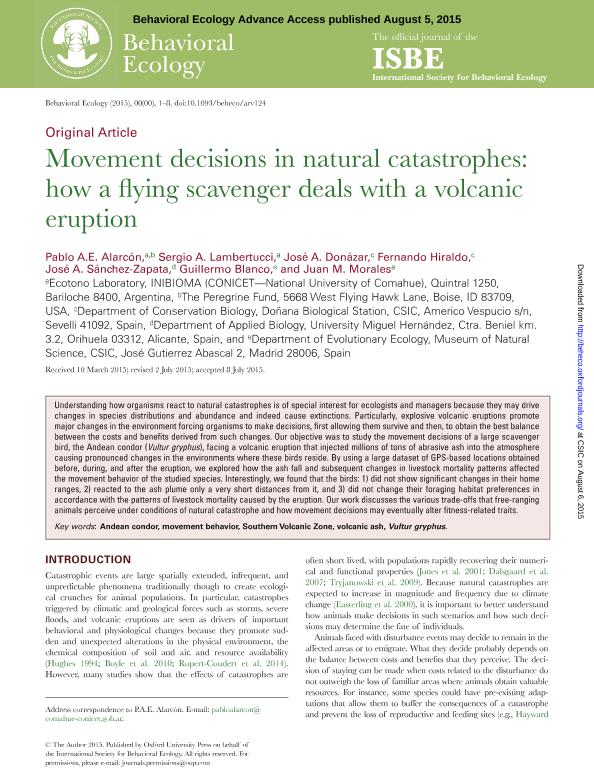Artículo
Movement decisions in natural catastrophes: How a flying scavenger deals with a volcanic eruption
Alarcón, Pablo Angel Eduardo ; Lambertucci, Sergio Agustin
; Lambertucci, Sergio Agustin ; Donázar, José A.; Hiraldo, Fernando; Sánchez Zapata, José A.; Blanco, Guillermo; Morales, Juan Manuel
; Donázar, José A.; Hiraldo, Fernando; Sánchez Zapata, José A.; Blanco, Guillermo; Morales, Juan Manuel
 ; Lambertucci, Sergio Agustin
; Lambertucci, Sergio Agustin ; Donázar, José A.; Hiraldo, Fernando; Sánchez Zapata, José A.; Blanco, Guillermo; Morales, Juan Manuel
; Donázar, José A.; Hiraldo, Fernando; Sánchez Zapata, José A.; Blanco, Guillermo; Morales, Juan Manuel
Fecha de publicación:
01/2016
Editorial:
Oxford Univ Press Inc
Revista:
Behavioral Ecology
ISSN:
1045-2249
Idioma:
Inglés
Tipo de recurso:
Artículo publicado
Clasificación temática:
Resumen
Understanding how organisms react to natural catastrophes is of special interest for ecologists and managers because they may drive changes in species distributions and abundance and indeed cause extinctions. Particularly, explosive volcanic eruptions promote major changes in the environment forcing organisms to make decisions, first allowing them survive and then, to obtain the best balance between the costs and benefits derived from such changes. Our objective was to study the movement decisions of a large scavenger bird, the Andean condor (Vultur gryphus), facing a volcanic eruption that injected millions of tons of abrasive ash into the atmosphere causing pronounced changes in the environments where these birds reside. By using a large dataset of GPS-based locations obtained before, during, and after the eruption, we explored how the ash fall and subsequent changes in livestock mortality patterns affected the movement behavior of the studied species. Interestingly, we found that the birds: 1) did not show significant changes in their home ranges, 2) reacted to the ash plume only a very short distances from it, and 3) did not change their foraging habitat preferences in accordance with the patterns of livestock mortality caused by the eruption. Our work discusses the various trade-offs that free-ranging animals perceive under conditions of natural catastrophe and how movement decisions may eventually alter fitness-related traits.
Archivos asociados
Licencia
Identificadores
Colecciones
Articulos(INIBIOMA)
Articulos de INST. DE INVEST.EN BIODIVERSIDAD Y MEDIOAMBIENTE
Articulos de INST. DE INVEST.EN BIODIVERSIDAD Y MEDIOAMBIENTE
Citación
Alarcón, Pablo Angel Eduardo; Lambertucci, Sergio Agustin; Donázar, José A.; Hiraldo, Fernando; Sánchez Zapata, José A.; et al.; Movement decisions in natural catastrophes: How a flying scavenger deals with a volcanic eruption; Oxford Univ Press Inc; Behavioral Ecology; 27; 1; 1-2016; 75-82
Compartir
Altmétricas



